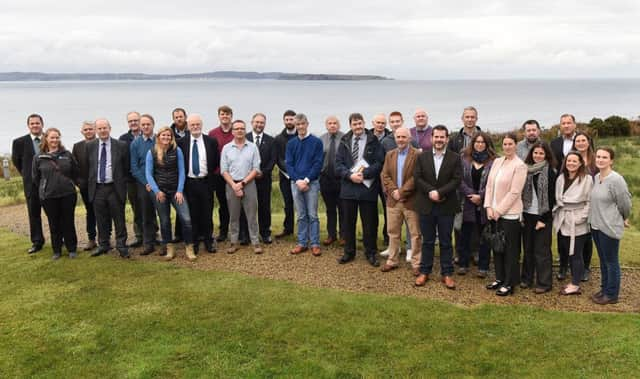AFBI leads new EU marine project


The COMPASS project, led and coordinated by researchers from the Agri-Food and Biosciences Institute (AFBI), will connect the regions’ leading marine research Institutes to form a cross-border network to protect vulnerable marine species and increase our understanding of ocean life in our seas.
Funding for the COMPASS project has been provided by the EU’s INTERREG VA programme, which is managed by the Special EU Programmes Body (SEUPB), to the tune of €6.3m.
Advertisement
Advertisement
This substantial investment will see a state-of-the-art network of buoys to effectively track, model and monitor aquatic life and the oceanographic processes which influence them across the seas that surround the three countries.
COMPASS will bring together experts to deliver regional-scale scientific programmes of work. The network will produce new marine monitoring data to investigate emerging areas of environmental concern including ocean acidification and increasing levels of ambient noise. The project will also develop hi-tech acoustic tag programmes to study migration patterns, behaviour, and mortality of salmon and sea trout in order to improve the management of fish stocks. Passive acoustic studies will provide new insights into the populations of marine mammals around our coasts, whilst advanced computer models will help us understand processes that require consideration over large geographical scales.
The COMPASS project will establish infrastructure that will enhance cross-border co-operation to ensure that information can be shared in a coherent and standardised way. This aspect of the project will allow data to flow into national and international marine monitoring programmes.
A spokesperson for the DAERA said: “The Department match-funded the COMPASS project to help deliver the first fully coherent network of marine monitoring buoys, connecting the core marine research institutions and government agencies operating in the coastal seas of Northern Ireland, Scotland and the Republic of Ireland. This network will generate essential baseline monitoring of animals, oceanographic factors and ambient noise in support of our Marine Protected Areas.
Advertisement
Advertisement
“The benefits of this AFBI-led research project include long-term monitoring strategies for highly mobile protected species such as marine mammals, and also fish such as salmon and eels which are of conservation and commercial importance.
“It will provide the department with key tools to enable sustainable management of Northern Ireland’s valuable marine resources and I am delighted to see this project coming to fruition.”
Mr Simon Coveney, TD Minister for Housing, Planning, Community and Local Government, said: “I am pleased to financially support this cross-border project, noting that the increased understanding of oceanic life to be delivered by the COMPASS Project will assist in protecting and supporting ocean biodiversity in a real, meaningful and sustained fashion.”
Welcoming the funding the Scottish Environment Secretary Roseanna Cunningham said: “It is fantastic news that this ambitious programme of work is being funded.
Advertisement
Advertisement
“The monitoring will provide valuable information to help manage Scotland’s marine biodiversity and contribute to achieving Scotland’s vision of clean, safe, healthy and biologically diverse seas.
“I’m delighted that Scotland is playing such a crucial role in this collaborative international project, bringing significant skills and resources from both Marine Scotland Science and the Scottish Association for Marine Science,” she continued.
Welcoming the project, Gina McIntyre, CEO of the SEUPB, said: “Meeting some of the key environmental protection objectives of the EU’s INTERREG VA Programme, this project will help monitor and manage more effectively the marine protected areas and species across Northern Ireland, Ireland and Scotland now and in the future, and in so doing also create an invaluable cross-border partnership.
“Over the years the European Union has established a robust policy framework to address the multiple challenges facing our shared marine environment. This project will serve to further EU policy in this area and provide invaluable information relating to ocean acidification and the long-term impact of ambient noise on sea-life,” she continued.